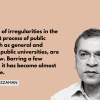Why we must adopt value-based healthcare

"I do not want to fix this hospital anymore. I do not want to fix this system; I want to tear it all down and build something better," said the character of medical director Dr Max Goodwin on the TV show "New Amsterdam". With that motto, he eventually turned the profit-oriented fee-for-service-based public hospital into an empathetic, patient-centric, whole-person care facility.
To begin, the freshly minted hospital director fired entire departments, hired new employees, and then turned the revenue-focused physicians into "real doctors" through motivation and incentives, and finally transitioned the facility into the epitome of value-based care!
The punishing healthcare costs in Bangladesh summon the need for medical directors like Dr Goodwin. Our healthcare system is broken. The fee-for-service model, in which providers unfairly charge patients for each and every service, has become an anathema for those seeking healthcare. The system allows providers to operate in a zero-sum game at the expense of patients. Patients and their families hang in the balance, not knowing how much the bill will be or whether they can even pay the sum. The issue has become unbearable, and we need to move to value-based care or whole-person care, which benefits both patients and providers.
Michael Porter and Elizabeth Teisberg have popularised value-based care through their masterpiece book "Redefining Health Care: Creating Value-Based Competition". Value-based care measures "patient outcomes per unit of costs". In this model, providers look at the full cycle of care over a patient's lifetime rather than providing intervention for a specific medical condition. It involves monitoring, prevention, treatment, and disease management so that ailments can be detected early on and dealt with. The focus is on prevention rather than cure.
In value-based models, healthcare systems not only provide medical care but also tackle non-medical factors that impact a patient's health such as housing, neighbourhood, employment, stress, social isolation, bereavement, emotional issues, etc. Providers take a 360-degree look at the patient's socio-economic conditions and take great care to treat the whole person. They collaborate with government agencies, social organisations, community-based providers, and others to help clients meet their needs.
The authorities must determine the cost variance for diagnosis and treatment of various medical conditions to limit health systems' abilities to flex their muscles when it comes to costs. This will discourage providers from taking patients hostage with their whimsical and unethical practices.
Unfortunately, Bangladesh's healthcare system cannot be farther from this model. Of course, recently, lump-sum capped payments for clinically defined episodes of care are beginning to come up in the form of temporary prepaid health insurance. But these types of insurance coverage are nothing but charades as they limit the amount and level of care obtainable within the period covered. They promote too much care or too little care or only a modicum of proper care, and patients fall for these ineffective "benefits". In fact, these new trends are more provider-centric than patient-friendly.
Bangladesh must implement strategies to promote whole-person care.
First, the government must develop policies to transition from the fee-for-service model to a value-based care system. It must reward good behaviour and punish bad practices. The authorities must determine the cost variance for diagnosis and treatment of various medical conditions to limit health systems' abilities to flex their muscles when it comes to costs. This will discourage providers from taking patients hostage with their whimsical and unethical practices.
Second, we must invest more heavily in health information technology. Unfortunately, in Bangladesh, digitisation in healthcare remains mediocre. Some apps and mobile-based technology assist with providing only a number of services such as electronic immunisation registration, monitoring access to essential medicines, pharmacy delivery, making appointments, etc – which are far from genuine e-health.
We need advanced technology that enables unhindered data sharing and allows one single source of truth for patients' social and medical history. Studies show that data sharing among providers eliminates duplicative medical procedures. It also reduces hospital readmission, increases revenue for providers, and decreases uncontrolled diabetes in addition to promoting many other health indicators. As a whole, data sharing improves the quality of care.
Last but not least, we must promote and diversify transitional care management, which is a powerful value-based instrument that can vastly reduce healthcare costs. Transitional care management allows post-discharge care coordination. After release from acute care, patients must be properly educated on their conditions, medication, and daily care to prevent readmission. Most people lack knowledge of when to see emergency doctors and when to only seek primary care. Transitional care educates patients on their overall well-being. Primary care providers, nursing facilities, and community-based organisations are best positioned to provide post-discharge care management. Transitional care also allows providers to earn additional revenue through follow-up appointments while keeping patients from spending on emergency department visits.
The fictional Dr Goodwin transformed a public hospital into a quintessence of care with a simple slogan, "How can I help you?" He stood up to the vested interests who fought to maintain the status quo and continue to commercialise healthcare. It was indeed a journey for him and his dedicated team of doctors.Promoting value-based care in Bangladesh, of course, will also be nothing short of a journey. And a journey is bound to be rocky. Still, we must embark on it.
ABM Uddin serves as a healthcare consultant for the Florida Agency for Health Care Administration. Views expressed in the article are the author's own.

 For all latest news, follow The Daily Star's Google News channel.
For all latest news, follow The Daily Star's Google News channel. 










Comments